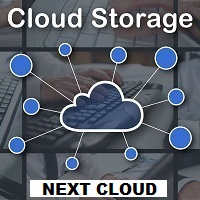Cloud Solutions
Simply put, cloud computing is the delivery of computing services—including servers, storage, databases, networking, software, analytics, and intelligence—over the internet (“the cloud”) to offer faster innovation, flexible resources, and economies of scale.
How cloud computing services work
Cloud computing services have several common attributes:
- Virtualization– cloud computing utilizes server and storage virtualization extensively to allocate/reallocate resources rapidly
- Multi-tenancy -resources are pooled and shared among multiple users to gain economies of scale
- Network-access – resources are accessed via web-browser or thin client using a variety of networked devices (computer, tablet, smartphone)
- On demand – resources are self-provisioned from an online catalogue of pre-defined configurations
- Elastic -resources can scale up or down, automatically
- Metering/chargeback -resource usage is tracked and billed based on service arrangement
Among the many types of cloud computing services delivered internally or by third party service providers, the most common are:
- Software as a Service (SaaS)– software runs on computers owned and managed by the SaaS provider, versus installed and managed on user computers. The software is accessed over the public Internet and generally offered on a monthly or yearly subscription.
- Infrastructure as a Service (IaaS) – compute, storage, networking, and other elements (security, tools) are provided by the IaaS provider via public Internet, VPN, or dedicated network connection. Users own and manage operating systems, applications, and information running on the infrastructure and pay by usage.
- Platform as a Service (PaaS) – All software and hardware required to build and operate cloud-based applications are provided by the PaaS provider via public Internet, VPN, or dedicated network connection. Users pay by use of the platform and control how applications are utilized throughout their lifecycle.
Benefits of cloud computing services
Cloud computing services offer numerous benefits to include:
- Faster implementation and time to value
- Anywhere access to applications and content
- Rapid scalability to meet demand
- Higher utilization of infrastructure investments
- Lower infrastructure, energy, and facility costs
- Greater IT staff productivity and across organization
- Enhanced security and protection of information assets

Most Popular
STARTER
R85 pm
- 20gig Storage
- 5 Users
- Calendar / Task / Contact Sync
- Windows / Andriod Sync Client
Most Popular
ECONO
R105 pm
- 30gig Storage
- 5 Users
- Calendar / Task / Contact Sync
- Windows / Andriod Sync Client
Most Popular
STANDARD
R135 pm
- 50gig Storage
- 5 Users
- Calendar / Task / Contact Sync
- Windows / Andriod Sync Client
Most Popular
PRO
R165 pm
- 100gig Storage
- 10 Users
- Calendar / Task / Contact Sync
- Windows / Andriod Sync Client
Most Popular
ADVANCE
R185 pm
- 200gig Storage
- 20 Users
- Calendar / Task / Contact Sync
- Windows / Andriod Sync Client
ADV 300
R245 pm
- 300gig Storage
- 30 Users
- Calendar / Task / Contact Sync
- Windows / Andriod Sync Client
Most Popular
ADV 400
R275 pm
- 400gig Storage
- 30 Users
- Calendar / Task / Contact Sync
- Windows / Andriod Sync Client
Most Popular
ADV 500
R375 pm
- 500gig Storage
- 50 Users
- Calendar / Task / Contact Sync
- Windows / Andriod Sync Client

